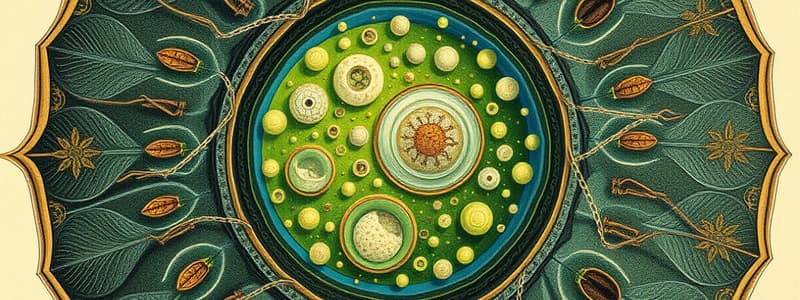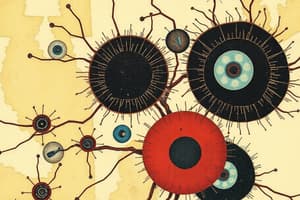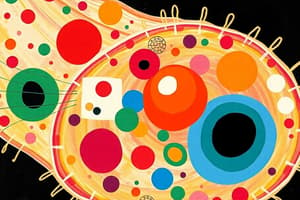Podcast
Questions and Answers
What is the primary function of the plasma membrane in a eukaryotic cell?
What is the primary function of the plasma membrane in a eukaryotic cell?
- Produce ribosomes
- Coordinate cellular activities
- Store genetic information
- Regulate the passage of materials (correct)
Which organelle is responsible for producing ribosomal RNA?
Which organelle is responsible for producing ribosomal RNA?
- Plasma Membrane
- Cytoplasm
- Nucleolus (correct)
- Nucleus
How does the nucleus contribute to the cell's functions?
How does the nucleus contribute to the cell's functions?
- Synthesizing lipids
- Regulating ion transport
- Storing ATP molecules
- Controlling gene expression (correct)
What is the significance of organelles within a cell?
What is the significance of organelles within a cell?
Which of the following statements best describes eukaryotic cells?
Which of the following statements best describes eukaryotic cells?
What role do histones play in the nucleus?
What role do histones play in the nucleus?
What is a crucial role of the cell membrane in metabolism?
What is a crucial role of the cell membrane in metabolism?
Which of the following best characterizes the function of the nucleolus?
Which of the following best characterizes the function of the nucleolus?
What is the primary function of ribosomes?
What is the primary function of ribosomes?
Where are free ribosomes located?
Where are free ribosomes located?
Which structure is part of the endomembrane system?
Which structure is part of the endomembrane system?
What does the rough endoplasmic reticulum primarily assist with?
What does the rough endoplasmic reticulum primarily assist with?
What is one of the roles of smooth endoplasmic reticulum?
What is one of the roles of smooth endoplasmic reticulum?
How does the endomembrane system primarily function?
How does the endomembrane system primarily function?
What type of ribosomes are involved in making proteins for organelles like lysosomes?
What type of ribosomes are involved in making proteins for organelles like lysosomes?
Which function is associated with the smooth endoplasmic reticulum?
Which function is associated with the smooth endoplasmic reticulum?
What is the main role of lysosomes in cells?
What is the main role of lysosomes in cells?
Which process is NOT associated with lysosomes?
Which process is NOT associated with lysosomes?
What is one of the functions of the Golgi apparatus?
What is one of the functions of the Golgi apparatus?
Which of the following does NOT occur in the Golgi apparatus?
Which of the following does NOT occur in the Golgi apparatus?
Which statement about vacuoles is accurate?
Which statement about vacuoles is accurate?
What role do lysosomes play in apoptosis?
What role do lysosomes play in apoptosis?
What modification is commonly performed by the Golgi apparatus on proteins?
What modification is commonly performed by the Golgi apparatus on proteins?
Which of the following is NOT a function of vacuoles?
Which of the following is NOT a function of vacuoles?
What is one of the main functions of vacuoles in plant cells?
What is one of the main functions of vacuoles in plant cells?
How do mitochondria contribute to cellular function?
How do mitochondria contribute to cellular function?
What is the role of chloroplasts in plant cells?
What is the role of chloroplasts in plant cells?
Which of the following organelles is specifically involved in detoxifying hydrogen peroxide?
Which of the following organelles is specifically involved in detoxifying hydrogen peroxide?
What is one of the functions of the glyoxylate cycle?
What is one of the functions of the glyoxylate cycle?
What do thylakoids in chloroplasts mainly contain?
What do thylakoids in chloroplasts mainly contain?
What type of energy do mitochondria primarily convert?
What type of energy do mitochondria primarily convert?
What is a function of enzymes found in vacuoles?
What is a function of enzymes found in vacuoles?
Study Notes
Overview of the Cell
- Cells are specialized units capable of survival, growth, and reproduction, functionally similar to organs in a body.
- Eukaryotic cells have a complex internal organization facilitating life functions, contrasting with prokaryotic cells which lack organelles.
Cell Organelles
- Individual structures within cells with unique roles ensuring proper cellular function.
Plasma Membrane: The Dynamic Barrier
- Maintains a stable internal environment, allowing concurrent incompatible processes.
- Provides structural support and participates in enzymatic reactions and transport across the membrane.
- Regulates material passage in and out of the cell.
Nucleus: The Information Center
- Stores and organizes genetic information (DNA) compactly with histones.
- Regulates gene expression and coordinates cellular activities like metabolism and division.
Nucleolus: The Ribosome Factory
- Produces ribosomal RNA (rRNA) and assembles ribosomal subunits.
- Modifies rRNA for proper folding before ribosome assembly.
- Regulates the cell cycle and stress responses.
Ribosome: The Protein Factories
- Synthesizes proteins by translating mRNA into polypeptide chains.
- Two types: free ribosomes (in cytoplasm) and bound ribosomes (attached to Er or nuclear envelope).
Endomembrane System
- A network of membranes and organelles modifying, packaging, and transporting lipids and proteins.
- Comprises nuclear envelope, lysosomes, vesicles, endoplasmic reticulum (ER), Golgi apparatus, and plasma membrane.
Endoplasmic Reticulum: The Biosynthetic Factory
- Interconnected membranous sacs and tubules; modifies proteins and synthesizes lipids.
- Rough ER: Studded with ribosomes involved in protein synthesis and modification.
- Smooth ER: Synthesizes lipids, detoxifies harmful substances, and stores calcium ions.
Golgi Apparatus: Shipping & Receiving Center
- Modifies and sorts proteins and lipids from the ER.
- Responsible for glycosylation of proteins and lipid modifications.
- Produces lysosomes, facilitating waste breakdown.
Lysosomes: The Digestive Compartments
- Membranous sacs containing hydrolytic enzymes for macromolecule digestion.
- Engages in intracellular digestion, autophagy, and programmed cell death (apoptosis).
Vacuoles: Diverse Maintenance Compartment
- Primarily found in plant and fungal cells for storage of water, nutrients, and waste.
- Maintains turgor pressure, crucial for plant structure.
Mitochondria: Chemical Energy Conversion Sites
- Known as the cell's powerhouses; essential for ATP production.
- Involvement in metabolic regulation, apoptosis, and storage of calcium.
Chloroplast: Light Energy Capture
- Lens-shaped organelles conducting photosynthesis through thylakoids and stroma.
- Contains different plastid types (chloroplasts, chromoplasts, leucoplasts).
Peroxisomes: Oxidation Sites
- Metabolic compartments that detoxify harmful substances and produce hydrogen peroxide.
- Involved in fatty acid oxidation and critical lipid biosynthesis.
Summary
- Eukaryotic cells contain various organelles, each fulfilling specific functions for maintaining life processes.
- The intricate organization allows cells to adapt and respond to environmental changes effectively.
Studying That Suits You
Use AI to generate personalized quizzes and flashcards to suit your learning preferences.
Related Documents
Description
Explore the fundamental components of cells in this quiz based on Lecture 2 from Bio 110. Understand the differences between eukaryotic and prokaryotic cells, as well as the unique functions of various organelles. This quiz will enhance your knowledge about cellular organization and regulation.




